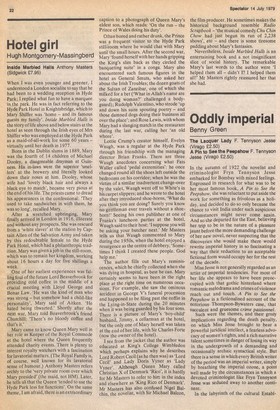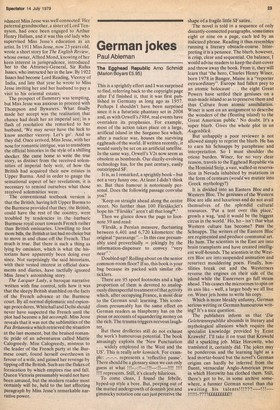Oddly imperial
Benny Green
The Lacquer Lady F. Tennyson Jesse (Virago £2.50) A Pin to See the Peepshow F. Tennyson Jesse (Virago £2.50) In the autumn of 1922 the novelist and criminologist Fryn Tennyson Jesse embarked for Bombay with mixed feelings. Engrossed in research for what was to be her most famous book, A Pin to See the Peepshow, she was reluctant to put aside the work for something as frivolous as a holiday, and decided to do so only because the chance to visit India under such auspicious circumstances might never come again. And so she departed for the East, believing her trip to be in the nature of a pleasure jaunt before the more demanding challenge of her new novel, never suspecting that the discoveries she would make there would rewrite imperial history in so fascinating a way that their reduction to an acceptable fictional form would occupy her for the rest of the decade.
Miss Jesse is not generally regarded as an artist of imperial tendencies. For most of her life she appears to have been preoccupied with that gothic hinterland where romantic melodrama and crimes of violence reach out and touch. A Pin to See the Peepshow is a fictionalised account of the notorious Thompson-Bywaters case, that succulent and gruesome crime passionnel. Such were the themes, and their grisly implications regarding the death penalty, on which Miss Jesse brought to bear a powerful juridical intellect, a fearless advocacy of women's rights, and a rich narrative talent sometimes in danger of losing its way in the undergrowth of a demanding and occasionally archaic syntactical style. But there is a sense in which every British writer of the period was an imperial writer, simply by breathing the imperial ozone, a point well made by the circumstances in which a devoted criminologist like Fryn Tennyson Jesse was seduced away to another continent In the labyrinth of the cultural Establ ishment Miss Jesse was well connected. Her paternal grandmother, a sister of Lord Tennyson, had once been engaged to Arthur Henry Hallam, and it was this old lady who supervised Miss Jesse's education as an artist. In 1911 Miss Jesse, now 23 years old, wrote a short story for The English Review, whose owner, Alfred Mond, knowing of her keen interest in jurisprudence, introduced her to the Attorney-General, Sir Rufus Isaacs, who instructed her in the law. By 1922 Isaacs had become Lord Reading, Viceroy of India, and late that year he wrote to Miss Jesse inviting her and her husband to pay a visit to his oriental estates.
The prospect of flummery was tempting, but Miss Jesse was anxious to proceed with Thompson and Bywaters. What finally made her accept was the realisation that chance had dealt her an imperial ace; in a flash of resolution she remarked to her husband, 'We may never have the luck to know another viceroy. Let's go'. And so they did. Once arrived, Miss Jesse, with her nose for romantic intrigue, was to transform the official histories in the style of a shilling shocker. She came home to write the true story, as distinct from the received solemnities of imperial holy writ, of how the British had acquired their new estates in Upper Burma. And in order to gauge the sensational aspect of her revelations, it is necessary to remind ourselves what those received solemnities were.
The conventional textbook version is that the British, having left Upper Burma to the Burmese provided that they, the British, could have the rest of the country, were troubled by tendencies in the barbaric Burmese royal court towards French rather than British emissaries. Unwilling to foot more bills, the British at last, had no choice but to move in and chase off the French. That much is true. But there is such a thing as lying by omission, which is what the historians have apparently been doing ever since. Not surprisingly the said historians, with their vested interest in official documents and diaries, have tactfully ignored Miss Jesse's astonishing story.
The Lacquer Lady, a baroque narrative written with fine control, tells how it was that the sleepy British stumbled on the facts of the French advance at the Burmese court, 13y all normal diplomatic and espionage procedures, Whitehall and Delhi should never have suspected the French until the plot had become a fait accompli. Miss Jesse reveals that it was not the sublimities of the Pax Britannica which retrieved the situation at the last moment, but the bruised romantic pride of an adventuress called Mattie Calogreedy. Miss Calogreedy, mistress to the leader of the French party at the Burmese court, found herself overthrown in favour of a wife, and gained her revenge by tipping off the British. Such are the flukes of fornication by which empires rise and fall. Queen Victoria presumably would not have been amused, but the modern reader most certainly will be, held to the last affecting paragraph by Miss Jesse's remarkable narrative power.



































 Previous page
Previous page